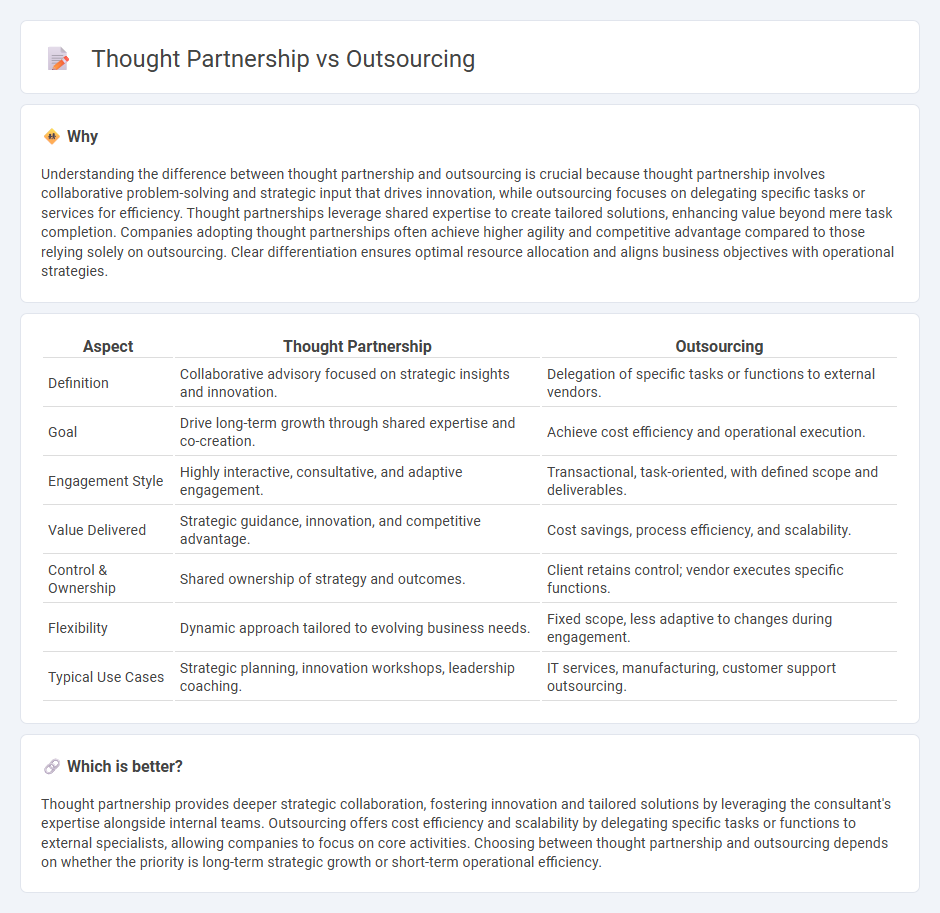
Thought partnership in consulting involves collaborative problem-solving and strategic guidance, leveraging deep expertise to drive innovation and long-term growth. Outsourcing primarily focuses on delegating specific tasks or processes to external providers to enhance efficiency and reduce costs. Explore how choosing between thought partnership and outsourcing can transform your business outcomes.
Why it is important
Understanding the difference between thought partnership and outsourcing is crucial because thought partnership involves collaborative problem-solving and strategic input that drives innovation, while outsourcing focuses on delegating specific tasks or services for efficiency. Thought partnerships leverage shared expertise to create tailored solutions, enhancing value beyond mere task completion. Companies adopting thought partnerships often achieve higher agility and competitive advantage compared to those relying solely on outsourcing. Clear differentiation ensures optimal resource allocation and aligns business objectives with operational strategies.
Comparison Table
| Aspect | Thought Partnership | Outsourcing |
|---|---|---|
| Definition | Collaborative advisory focused on strategic insights and innovation. | Delegation of specific tasks or functions to external vendors. |
| Goal | Drive long-term growth through shared expertise and co-creation. | Achieve cost efficiency and operational execution. |
| Engagement Style | Highly interactive, consultative, and adaptive engagement. | Transactional, task-oriented, with defined scope and deliverables. |
| Value Delivered | Strategic guidance, innovation, and competitive advantage. | Cost savings, process efficiency, and scalability. |
| Control & Ownership | Shared ownership of strategy and outcomes. | Client retains control; vendor executes specific functions. |
| Flexibility | Dynamic approach tailored to evolving business needs. | Fixed scope, less adaptive to changes during engagement. |
| Typical Use Cases | Strategic planning, innovation workshops, leadership coaching. | IT services, manufacturing, customer support outsourcing. |
Which is better?
Thought partnership provides deeper strategic collaboration, fostering innovation and tailored solutions by leveraging the consultant's expertise alongside internal teams. Outsourcing offers cost efficiency and scalability by delegating specific tasks or functions to external specialists, allowing companies to focus on core activities. Choosing between thought partnership and outsourcing depends on whether the priority is long-term strategic growth or short-term operational efficiency.
Connection
Thought partnership enhances consulting by fostering collaborative problem-solving and strategic insight, which outsourcing leverages to access specialized expertise and cost efficiency. Combining thought partnership with outsourcing enables organizations to drive innovation and optimize resource allocation simultaneously. This synergy results in agile decision-making and scalable solutions tailored to dynamic business needs.
Key Terms
Service Delivery
Outsourcing in service delivery primarily involves delegating specific tasks or processes to external providers to improve efficiency and reduce costs, often emphasizing transactional engagement and predefined deliverables. Thought partnership, however, centers on collaborative innovation and strategic alignment, with external experts actively contributing insights and co-creating solutions that enhance service quality and drive business outcomes. Explore how integrating thought partnership can transform your service delivery and foster sustainable competitive advantages.
Strategic Advisory
Outsourcing involves delegating specific tasks or functions to external providers, often for cost efficiency and operational execution, whereas thought partnership centers on collaborative strategic advisory that drives innovation and long-term value creation. Strategic advisory through thought partnership leverages deep industry expertise and co-creative problem-solving to align business goals with emerging market trends and disruptive technologies. Explore how integrating thought partnership can transform your strategic outcomes beyond traditional outsourcing models.
Value Creation
Outsourcing focuses on cost efficiency and task delegation, while thought partnership emphasizes collaborative innovation and strategic growth, driving higher value creation through shared expertise and aligned goals. Thought partnerships leverage deep industry insights and adaptive problem-solving to unlock new opportunities beyond routine operational tasks. Explore how integrating thought partnerships can transform your value creation strategies.
Source and External Links
What Is Outsourcing? (Including Types and Advantages) | Indeed.com - Outsourcing is a business practice where organizations hire external contractors or companies to perform various tasks or produce goods, aiming to reduce costs and increase efficiency, with common outsourced functions including customer support, HR, accounting, and engineering.
What is Outsourcing and How Does it Work? - TechTarget - Outsourcing involves hiring a third-party provider to perform tasks or services either onsite or remotely, emphasizing partnership management and service relationships over just contractual agreements, often covering IT, customer service, HR, and finance functions.
What is Outsourcing? Definition, Advantages, and Examples - Outsourcing is contracting third-party suppliers to handle tasks previously done in-house to save costs, access expertise, and enhance focus on core business activities, though it can present communication challenges.
 dowidth.com
dowidth.com